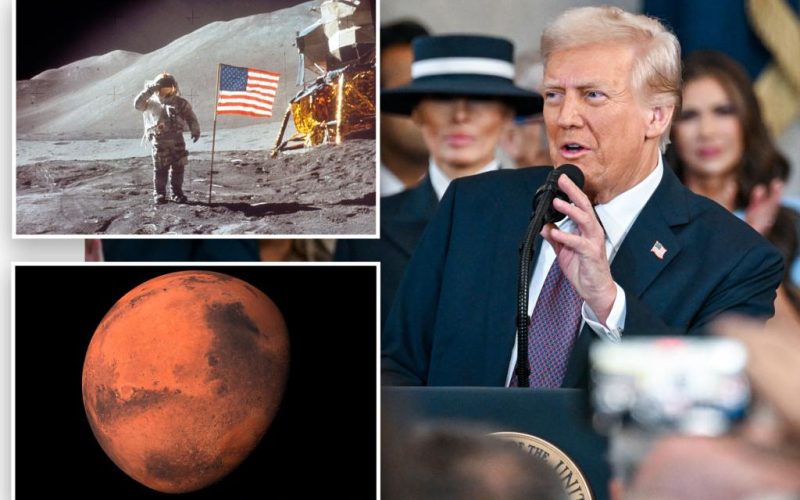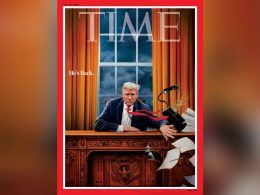President Trump vowed Monday to be the first commander-in-chief to put US astronauts on Mars.
“The United States will once again consider itself a growing nation, one that increases our wealth, expands our territory, builds our cities, raises our expectations and carries our flag into new and beautiful horizons,” Trump declared in his inaugural address in DC.
“And we will pursue our manifest destiny into the stars, launching American astronauts to plant the Stars and Stripes on the planet Mars,” he said.
American astronauts last walked on the moon in 1972 during the final Apollo mission. More than 15 years later, President George H.W. Bush called for further missions to Earth’s satellite and eventually to Mars.
Bush’s Space Exploration Initiative kicked off in July 1989 — 20 years after the successful Apollo 11 landing on the moon — but NASA later scrapped the prospect of planetary ventures in favor of more robotic adventures into the galaxy.
President Bill Clinton officially ended the goal of humans traveling beyond Earth’s orbit as part of a national strategy.
But Trump confidant Elon Musk has predicted his company SpaceX could be able to put humans on the fourth planet from the sun by 2028.
“The first Starships to Mars will launch in 2 years,” he posted on X in September. “These will be uncrewed to test the reliability of landing intact on Mars.”
“If those landings go well, then the first crewed flights to Mars will be in 4 years,” he predicted.
The SpaceX founder and CEO wondered aloud about the possibility of “multiplanetary” life being a part of an effort to improve the overall quality of life for humans.
“Flight rate will grow exponentially from there, with the goal of building a self-sustaining city in about 20 years,” he added in his post. “Being multiplanetary will vastly increase the probable lifespan of consciousness, as we will no longer have all our eggs, literally and metabolically, on one planet.”
However, the tech billionaire has set the stage for a different set of rules on the Red Planet once humanity arrives, rejecting any governance by “Earth-based” authorities, according to terms of service shared in 2020 for SpaceX’s Starlink internet project.
His idea is for a self-sustaining city on Mars.
“For services provided on Mars, or in transit to Mars via Starship or other colonization spacecraft, the parties recognize Mars as a free planet and that no Earth-based government has authority or sovereignty over Martian activities,” a section of the terms reads.
Musk’s space company has “caught” starships returning to Earth after test flights in an unprecedented leap forward for interplanetary travel technology.
In his inaugural speech, Trump, 78, mentioned a Mars mission just after promising to “end of the chronic disease epidemic and keep our children safe, healthy and disease-free.”
“Above all, my message to Americans today is that it is time for us to once again act with courage, vigor and the vitality of history’s greatest civilization,” Trump said of his second administration’s interstellar effort.
“So as we liberate our nation, we will lead it to new heights of victory and success. We will not be deterred.”
Musk was critical to Trump’s re-election effort — donating roughly $250 million in the race’s final stretch to PACs and other campaign committees for digital ads and voter canvassing — and spent much of his time during the presidential transition at Trump’s Mar-a-Lago estate in Palm Beach.
Manifest Destiny was a concept popularized during the 19th century in America, as settlers headed west to annex territories that later became the states of Texas, New Mexico and California, among others.








